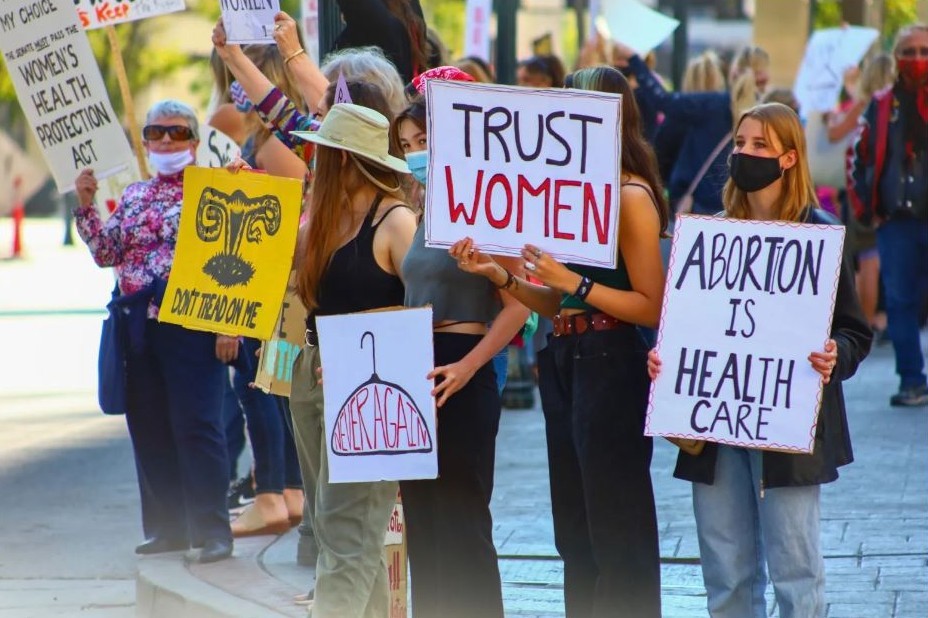
Staff reports | After months of deliberations, the U.S. Supreme Court Friday voted to overturn the landmark Roe v. Wade decision, ending constitutional protections for people seeking abortions. South Carolina leaders generally reacted along partisan lines.
The U.S. Supreme Court voted 6-3 to uphold Mississippi’s 20-week abortion ban in the case of Dobbs v. Jackson Women’s Health Organization, asserting that a person does not inherently have the right to privacy and that no provision in the U.S. Constitution protects the right to abortion. Justice Samuel Alito’s opinion declared the court’s decision in Roe was “egregiously wrong from the start” and that “its reasoning was exceptionally weak.” The decision does not ban abortions in the U.S., but it turns that decision over to the states.
Meanwhile in a separate decision related to a New York statute on guns, the high court ruled in a contradictory manner. It said the state did not have the authority to make decisions on whether a person could carry a concealed weapon.
South Carolina leaders react to abortion decision
Elected South Carolina leaders have already taken to social media and other platforms to shout cries of victory or grief over the court’s abortion decision.

“Today’s Supreme Court ruling is a resounding victory for the Constitution and for those who have worked for so many years to protect the lives of the most vulnerable among us,” Gov. Henry McMaster wrote on Twitter. “By the end of the day, we will file motions so that the Fetal Heartbeat Act will go into effect in South Carolina and immediately begin working with members of the General Assembly to determine the best solution for protecting the lives of unborn South Carolinians.”
But McMaster’s Democratic gubernatorial opponent in this November’s general election, former U.S. Rep. Joe Cunningham, vowed to use his authority as governor, should he win, to ensure abortion rights remain intact in the Palmetto State.

“This is a dark day in American history,” he said in a statement. “The four walls of a doctor’s office simply aren’t big enough for a woman, her partner, her doctor and the government. But the government has decided to force themselves in anyway.
“Governor McMaster and radical politicians in Columbia have already pledged to ban all abortions in South Carolina with no exceptions for rape, incest or life of the mother,” he continued. “The only thing standing in the way of this draconian reality is my veto pen. As governor, I won’t hesitate to use that pen to stand up for women and their right to control their own bodies.”
Various political reactions fell nearly perfectly along party lines.
“Today’s opinion overturning Roe v. Wade pits states against states for legal abortion access and creates terrifyingly difficult barriers for women and families who live in states controlled by Republicans,” the state Democratic Party saidy in a statement. “Elections have consequences and it will be up to voters to push back on the GOP’s single-minded focus to gain control over your body by voting in November.”
U.S. Rep. Nancy Mace, R-Charleston, however, contended the decision wasn’t designed to outlaw abortion or restrict women’s rights, but instead puts the decision back on state legislators.
“Today’s ruling returns power back to the states and power back to Congress on policies pertaining to life, where it rightfully belongs,” she said on Twitter. “This ruling protects federalism inherent in our Constitution and also returns this power back to the people and those they elected to represent them.”
Dr. Annie Andrews, Mace’s Democratic opponent in the coming November election, said she hoped Friday’s court decision would be a rallying flag for Democrats to vote out Republican politicians.
“This is exactly what Nancy Mace’s Republican extremist party has spent decades fighting to accomplish,” she said in a statement. “It is more important than ever to vote them out, NOW. With this ruling, it is now up to Congress to codify abortion rights into law. Even though I am running against a woman, make no mistake, I am the only woman in this race who will fight for Lowcountry women to make their own reproductive decisions without interference from extremist politicians.”
What happens now in South Carolina?
With McMaster’s announced plan to file a motion to lift the injunction on South Carolina’s six-week ban by end of day Friday, many South Carolinians are wondering what steps the state will take next.

Several Republican S.C. House members, including House Speaker Murrell Smith of Sumter, former Speaker Jay Lucas of Darlington and Reps. John McCravy of Greenwood, Travis Moore of Spartanburg, Brian White of Anderson and Thomas Ligon of Chester, have already sponsored H. 5399, a bill that aims to entirely ban abortions. Though no other details on the bill have been released yet, McMaster has previously stated that he would support a bill that bans all abortions with no exceptions for situations like rape, incest or life-threatening complications for the mother.
Smith established an ad hoc committee at the end of May, chaired by McCravy, to seek public testimony on the impact an abortion ban would have on South Carolinians. The committee will flesh out details for the H. 5399 bill. The date of the public hearing has yet to be announced.
It’s unclear how far state legislators will try to take abortion restriction laws in South Carolina and whether or not they will try to pass legislation criminalizing abortion procedures and possibly even criminalizing out-of-state travel to receive abortion care.
Another bill currently in committee in the state Senate, S. 988, seeks to prohibit abortion procedures and “provide penalties for violating the prohibition,” though it’s unclear what those penalties could entail.
Meanwhile in White House remarks after the court’s decision, President Joe Biden said he would “do all in my power to help to protect a woman’s right in states where they will face the consequences of today’s decision. …
“While the court decision cast a dark shade over a large swath of the land, many states in this country still recognize a woman’s right to choose. So, if a woman lives in a state that restricts abortion, the Supreme Court’s decision does not prevent her from traveling from her home state to the state that allows it,” he continued. “It does not prevent a doctor in that state from treating her. As the attorney general made clear, women must remain free to travel safely to another state to seek care they need. My administration will defend that bedrock right.”
Skyler Baldwin and Samantha Connors, both of the Charleston City Paper, contributed to this story. Have a comment? Send to: feedback@statehousereport.com


